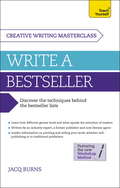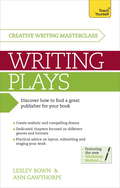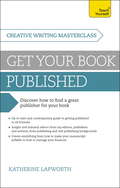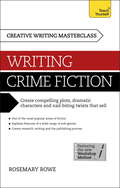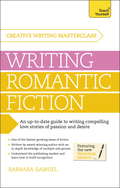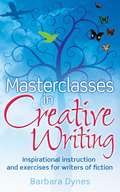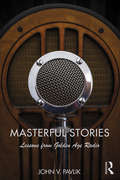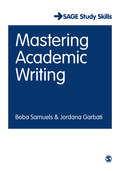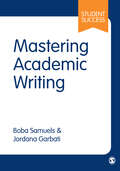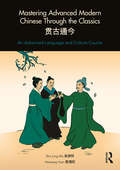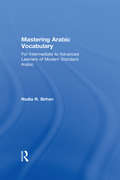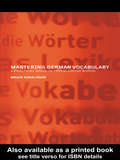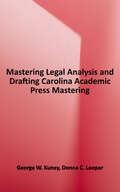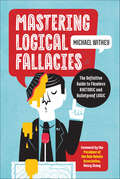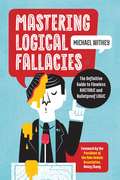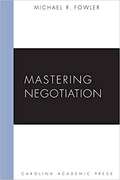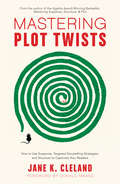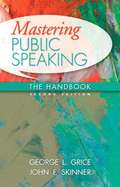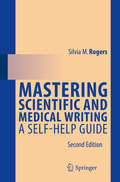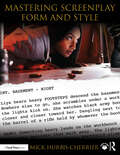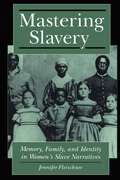- Table View
- List View
Masterclass: How to plan, write and publish a bestselling work of fiction
by Jacq BurnsLEARN HOW TO WRITE A BOOK WHICH STANDS OUT FROM THE CROWD.There is no precise formula for writing a bestseller, but there are secrets, skills and techniques that will dramatically improve your odds of publishing a bestselling novel.Whatever your motivation - whether sick of rejections, getting ready to approach a publisher, or with an idea you think is unbeatable - you need to read this book before you do anything else. It gives you the key insights into what makes a bestseller and explains the trends and conventions of different genres, before helping you get a real handle on the writing (and revising) process. A third of the book is devoted to pitching and selling your novel both to traditional agents and as a self-published author, with incisive and cutting-edge insights into writing for Amazon and becoming an 'authorpreneur'.ABOUT THE SERIESThe Teach Yourself Creative Writing series helps aspiring authors tell their story. Covering a range of genres from science fiction and romantic novels, to illustrated children's books and comedy, this series is packed with advice, exercises and tips for unlocking creativity and improving your writing. And because we know how daunting the blank page can be, we set up the Just Write online community at tyjustwrite, for budding authors and successful writers to connect and share.
Masterclass: Teach Yourself
by Lesley Bown Ann GawthorpeWriting Plays is the invaluable and comprehensive guide to anyone who wants to write plays and get them performed. It covers the basics of the theatre, creating and working with characters, writing realistic speech and dialogue, constructing compelling plots and creating a great ending. There are also separate chapters focused on writing for different genres, including pantomimes, musicals, radio and television. And a final section looks at the practicalities of laying out, submitting and staging your play.
Masterclass: Teach Yourself
by Jacq BurnsThere is no precise formula for writing a bestseller, but there are secrets, skills and techniques that will dramatically improve your odds of publishing a bestselling novel. Whatever your motivation - whether sick of rejections, getting ready to approach a publisher, or with an idea you think is unbeatable - you need to read this book before you do anything else. It gives you the key insights into what makes a bestseller and explains the trends and conventions of different genres, before helping you get a real handle on the writing (and revising) process. A third of the book is devoted to pitching and selling your novel both to traditional agents and as a self-published author, with incisive and cutting-edge insights into writing for Amazon and becoming an 'authorpreneur'.
Masterclass: Teach Yourself
by Katherine LapworthDo you have a completed manuscript ready for submission? Are you looking to successfully publish or self-publish your work? Do you have the level of understanding of the publishing industry? Whether you want to take a traditional route into print or want to digitally self-publish, this book will give you the advice you need on everything from submitting manuscripts to garnering reviews and promoting your work. It covers everything from polishing a final draft to managing your finances, and is also full of case studies, advice and tips from industry insiders from both traditional publishing and successful self-publishing backgrounds.
Masterclass: Teach Yourself
by Rosemary RoweDo you have an idea for a gripping crime novel? Would you like to know how to plot your book flawlessly? Do you want to create beautifully crafted characters and nail biting twists? This book is designed for anyone who wants to write an unputdownable crime novel. Whatever your subgenre, whether Scandi-crime or detective 'cosies', this book is full of inspirational advice, acute insights and practical exercises. The first part of the book establishes the rules of writing crime fiction - from convincing characters to the role of research. The book then covers the practical craft of writing and editing, before explaining in detail how to secure a contract and/or self-publish your work. A comprehensive guide for anyone who wants to be the next Val McDermid or Ian Rankin.
Masterclass: Writing Romantic Fiction Teach Yourself
by Barbara SamuelDo you want to capture the share of the fastest growing market in fiction? Do you have a compelling vision for a passionate love story? Masterclass: Write Romantic Fiction is designed for anyone who wants to write in this genre of popular fiction, whatever their focus. It is the only book available to cover the new and increasingly diverse sub-genres in romance to give insight into how to write really good eroticism, and to show aspiring writers how to gain recognition for their work. Whether contemplating self-publishing or going the traditional route, this is a smart and completely contemporary guide to writing sellable, credible and memorable romance.
Masterclasses in Creative Writing: Inspirational instruction and exercises for writers of fiction
by Barbara DynesWhat often holds aspiring writers back is the lack of confidence to get started. How do I structure my story? How do I bring my characters to life and make them believable? How do I write convincing dialogue? In this dip-into book a professional, award-winning writer and lecturer on creative writing has developed a collection of revealing and highly accessible masterclasses that will inform and encourage creative writers. The book is arranged in easy-to-find subjects and includes mini tutorials, examples, top tips, and summaries of learning points in· Developing all your writing skills· Keeping the reader involved· Creating great characters· Writing natural dialogue· Using viewpoint effectively· Enjoying the process of writingThe lessons are designed to increase your skills, add to your knowledge, and help you fulfil your creative potential.
Masterclasses in Creative Writing: Inspirational instruction and exercises for writers of fiction
by Barbara DynesWhat often holds aspiring writers back is the lack of confidence to get started. How do I structure my story? How do I bring my characters to life and make them believable? How do I write convincing dialogue? In this dip-into book a professional, award-winning writer and lecturer on creative writing has developed a collection of revealing and highly accessible masterclasses that will inform and encourage creative writers. The book is arranged in easy-to-find subjects and includes mini tutorials, examples, top tips, and summaries of learning points in· Developing all your writing skills· Keeping the reader involved· Creating great characters· Writing natural dialogue· Using viewpoint effectively· Enjoying the process of writingThe lessons are designed to increase your skills, add to your knowledge, and help you fulfil your creative potential.
Masterful Stories: Lessons from Golden Age Radio
by John V PavlikThe early eras of radio storytelling have entered and continue to enter the public domain in large quantities, offering unprecedented access to the Golden Age of Radio. Author and Professor John Pavlik mines the best this age of radio has to offer in Masterful Stories, an examination of the masterpieces of audio storytelling. This book provides a chronological history of the best of the best from radio’s Golden Age, outlining a core set of principles and techniques that made these radio plays enduring examples of storytelling. It suggests that, by using these techniques, stories can engage audiences emotionally and intellectually. Grounded in a historical and theoretical understanding of radio drama, this volume illuminates the foundational works that proceeded popular modern shows such as Radiolab, The Moth, and Serial. Masterful Stories will be a powerful resource in both media history courses and courses teaching audio storytelling for modern radio and other audio formats, such as podcasting. It will appeal to audio fans looking to learn about and understand the early days of radio drama.
Mastering Academic Writing (SAGE Study Skills Series)
by Boba Samuels Jordana GarbatiFocusing on research-related assignments, this book helps you navigate the potential pitfalls of academic writing through the experience of students who face the same challenges you do. Packed with hands-on exercises and insightful feedback, this workbook gives you the practice you need to fine tune your academic writing. Using their years of experience coaching students, the authors help you to: Develop and hone arguments Organise and interpret source material Write effective research proposals Follow academic conventions with confidence Complete collaborative writing projects. Perfect for anyone transitioning from undergraduate to postgraduate degrees, Mastering Academic Writing provides the skills, tips, and tricks you need to move beyond the basics of academic writing and meet the new expectations of further study. SAGE Study Skills are essential study guides for students of all levels. From how to write great essays and succeeding at university, to writing your undergraduate dissertation and doing postgraduate research, SAGE Study Skills help you get the best from your time at university. Visit the SAGE Study Skills hub for tips, resources and videos on study success!
Mastering Academic Writing (SAGE Study Skills Series)
by Boba Samuels Jordana GarbatiFocusing on research-related assignments, this book helps you navigate the potential pitfalls of academic writing through the experience of students who face the same challenges you do. Packed with hands-on exercises and insightful feedback, this workbook gives you the practice you need to fine tune your academic writing. Using their years of experience coaching students, the authors help you to: Develop and hone arguments Organise and interpret source material Write effective research proposals Follow academic conventions with confidence Complete collaborative writing projects. Perfect for anyone transitioning from undergraduate to postgraduate degrees, Mastering Academic Writing provides the skills, tips, and tricks you need to move beyond the basics of academic writing and meet the new expectations of further study. SAGE Study Skills are essential study guides for students of all levels. From how to write great essays and succeeding at university, to writing your undergraduate dissertation and doing postgraduate research, SAGE Study Skills help you get the best from your time at university. Visit the SAGE Study Skills hub for tips, resources and videos on study success!
Mastering Advanced Modern Chinese through the Classics: An Advanced Language and Culture Course
by Shu-Ling Wu Haiwang Yuan<p>Mastering Advanced Modern Chinese through the Classics is a textbook to teach those who wish to achieve an advanced or native proficiency and cultural competence in modern Chinese, as well as to experience the beauty of Classical Chinese literature. <p>Collecting representative works containing vibrant views of Chinese culture from different dynasties, this book is focused on how the grammatical patterns, vocabulary, and idioms that are found in Classical Chinese are relevant in the modern adaptation of the language, and how the accumulated traditional values and beliefs found there still shape the thinking and lifestyle of modern society. Online resources including audio, answer keys, and instructor aids will be part of the teaching package.</p>
Mastering Arabic Vocabulary: For Intermediate to Advanced Learners of Modern Standard Arabic
by Nadia R. SirhanMastering Arabic Vocabulary provides a structured vocabulary course for undergraduate and advanced students of Arabic. Arranged thematically, and by root, the course presents the key vocabulary that a well-informed Arabic speaker should have at their disposal when discussing diverse topics from business and politics to culture, society, science and technology. The course includes a wealth of exercises throughout to support learners from passive recognition to an increase in their active vocabulary. With free MP3s available online to allow learners to familiarise themselves with the pronunciation of each word provided in the book, Mastering Arabic Vocabulary is the ideal reference source for students of Arabic to build and expand their vocabulary.
Mastering Communication with Seriously Ill Patients
by Walter Baile Anthony Back Robert Arnold James Tulsky Kelly Fryer-EdwardsPhysicians who care for patients with life-threatening illnesses face daunting communication challenges. Patients and family members can react to difficult news with sadness, distress, anger, or denial.
Mastering German Vocabulary: A Practical Guide to Troublesome Words
by Bruce DonaldsonHow often have you looked up an English word in a German dictionary only to be confronted by a bewildering array of German equivalents? Which is the correct word for the context in question? Thirty years' experience in teaching Germanic languages at tertiary level to English-speaking students have made the author acutely aware of this problem. Mastering German Vocabulary explains how to use over 2,200 common German words correctly, using example sentences in German with English translations.In order to aid quick consultation, all German and English words are listed in separate indexes. The book is designed for all upper secondary and tertiary students of German and complements Routledge's grammar, dictionary and vocabulary building textbooks. It is a practical companion for anyone serious about perfecting their German.
Mastering Grammar class 8
by David Burns Saroja Nagarajan Elizabeth Celesia Dorthea BrookMastering Grammar (1 to 8) is a grammar series that facilitates the learners not only to grasp the fundamentals of English grammar but also to understand the nuances of the language in the Indian context. It is a unique combination of the traditional and functional s approach towards the teaching of grammar. This series makes a sincere attempt to teach grammar in a manner that concepts are comprehended without confusion and applications of these concepts made easy. The approach followed throughout the series is define, explain (with the help of diagrams, pictures and tables) and follow up with relevant, appropriate exercises to help the learners at each level. They will be able to comprehend, remember and apply easily what they have grasped. Review papers have been added to monitor progress. The section dealing with composition helps the learners organise their thoughts logically and express them with clarity and in a creative manner. Each book in this series is a perfect combination of a textbook and workbook and is a complete package in itself.
Mastering Legal Analysis and Drafting (Mastering Series)
by George W. Kuney Donna C. LooperThis book seeks to emphasize the fundamental structure and methods of legal drafting, which, the authors contend, are grounded in a surprisingly few, elemental rules and techniques of legal analysis and deployment of legal authorities amid relevant facts. It is designed to help the novice legal drafter identify those elemental rules and techniques and show how they are used to prepare effective legal writing in different formats, most of which share common elements and structures. <p><p>The book begins with a discussion of legal analysis, followed by a discussion of general drafting principles and rules, and then proceeds to apply these concepts in the following chapters to specific forms of legal writing including client letters, demand letters, research memoranda, motions and supporting documents, appellate briefs, contracts and instruments, and legislation. It closes with a chapter on "writing to build a record" that reprises the other chapters and highlights the key concepts.
Mastering Logical Fallacies: The Definitive Guide to Flawless Rhetoric and Bulletproof Logic
by Michael Withey"If I have learned anything in ten years of formal debating, it is that arguments are no different: without a good understanding of the rules and tactics, you are likely to do poorly and be beaten."—HENRY ZHANG, President of the Yale Debate AssociationYour argument is valid and you know it; yet once again you find yourself leaving a debate feeling defeated and embarrassed. The matter is only made worse when you realize that your defeat came at the hands of someone's abuse of logic—and that with the right skills you could have won the argument.The ability to recognize logical fallacies when they occur is an essential life skill. Mastering Logical Fallacies is the clearest, boldest, and most systematic guide to dominating the rules and tactics of successful arguments. This book offers methodical breakdowns of the logical fallacies behind exceedingly common, yet detrimental, argumentative mistakes, and explores them through real life examples of logic-gone-wrong.Designed for those who are ready to gain the upper hand over their opponents, this master class teaches the necessary skills to identify your opponents' misuse of logic and construct effective, arguments that win. With the empowering strategies offered in Mastering Logical Fallacies you'll be able to reveal the slight-of-hand flaws in your challengers' rhetoric, and seize control of the argument with bulletproof logic.
Mastering Logical Fallacies: The Most Common Uses And Abuses Of Logic And Rhetoric
by Michael Withey Henry Zhang"If I have learned anything in ten years of formal debating, it is that arguments are no different: without a good understanding of the rules and tactics, you are likely to do poorly and be beaten. "--HENRY ZHANG, President of the Yale Debate Association Your argument is valid and you know it; yet once again you find yourself leaving a debate feeling defeated and embarrassed. The matter is only made worse when you realize that your defeat came at the hands of someone's abuse of logic--and that with the right skills you could have won the argument. The ability to recognize logical fallacies when they occur is an essential life skill. Mastering Logical Fallacies is the clearest, boldest, and most systematic guide to dominating the rules and tactics of successful arguments. This book offers methodical breakdowns of the logical fallacies behind exceedingly common, yet detrimental, argumentative mistakes, and explores them through real life examples of logic-gone-wrong. Designed for those who are ready to gain the upper hand over their opponents, this master class teaches the necessary skills to identify your opponents' misuse of logic and construct effective, arguments that win. With the empowering strategies offered in Mastering Logical Fallacies you'll be able to reveal the slight-of-hand flaws in your challengers' rhetoric, and seize control of the argument with bulletproof logic.
Mastering Negotiation
by Michael R. FowlerThis comprehensive book covers the key stages of the negotiation process: choosing an approach, preparing to negotiate, initiating talks, moving to substantive bargaining and problem-solving, overcoming common difficulties, and closing a deal. It focuses on issues of negotiation strategy, especially those associated with the interest-based or mutual-gains negotiation that professional negotiators often use in complex disputes. Special features include chapters on cross-cultural negotiations, group negotiations, and ethical issues.
Mastering Plot Twists: How to Use Suspense, Targeted Storytelling Strategies, and Structure to Captivate Your Readers
by Donald Maass Jane Cleland"...A unique and absolutely invaluable toolbox for any author..." ~Kate White, New York Times best-selling author and former editor-in-chief of CosmopolitanUnlock the secrets to superior plot twists! The key to keeping people on the edge of their seat--from memoirs to thrillers and stage plays to screenplays--is filling your stories with unexpected twists and turns. By integrating Plot Twists, Plot Reversals, and Moments of Heightened Danger (TRDs) at crucial points, you can captivate your readers with I-can't-wait-to-see-what-happens-next intrigue. The quicker pace and focused action that comes from strategically placed twists form the core of the nuanced, multifaceted books that sell--and that help you find a devoted readership. In Mastering Plot Twists, Agatha Award-winning author, Jane K. Cleland goes beyond telling writers what to do; she shows you how to do it. Within these pages, you'll find:A proven, five-step process for using TRDs, with detailed examples from best-selling booksA deep dive into plotting, structure, pacing, subplots, and more to help you develop surprising yet inevitable twists."Jane's Plotting Roadmap" and worksheets--essential tools for planning your plotBuilding on the award-winning instruction provided in Mastering Suspense, Structure & Plot, Cleland's newest guide will help you create effective and credible twists, creating the kind of stories that will keep your readers up long into the night. "...A master class in crafting plots that twist and turn..." ~Hallie Ephron, New York Times best-selling author of You'll Never Know, Dear
Mastering Public Speaking: The Handbook
by John Skinner George GriceUpdated in a new 2nd edition, this book equips readers with a firm grounding in the "hows" and "whys" of public speaking by providing an ideal balance of theory and skills while placing important emphasis on critiquing, ethics, and critical thinking. <p><p> By eliminating those activities not essential to learning the basics of public speaking, readers are then able to learn how to think critically as they choose speech topics, conduct research, organize content, select language, manage nervousness, and deliver speeches. Additionally, the tabbed sections include a quick overview to the chapters within the section.
Mastering Scientific and Medical Writing
by Silvia M. RogersThis self-help guide is intended for scientists and medical professionals and students who wish to improve their scientific writing skills. Exercises invite the reader to practice the most important aspects of scientific writing. Although the book addresses certain issues more troublesome to scientific communicators of a non-English language origin, the guide will be of equal benefit to those whose first language is English. If you want not only to write but to write well, this book is for you. This second edition takes into account new developments in the area of scientific communication. In particular, the importance of authenticity is addressed, drawing attention to the sensitive issue of plagiarism in scientific texts.
Mastering Screenplay Form and Style
by Mick Hurbis-CherrierMastering Screenplay Form and Style shows you how professional screenwriters actually write scripts. This reference manual explores all aspects of the form, from essential format requirements to the expressive, literary qualities of screenplay language. Organized in three parts, this book systematically reveals the full essence of the screenwriter’s craft. The Ground Rules: Take a deep dive into the fundamental rhetorical concepts for dramatizing a story for the screen - the craft and style concepts that underpin everything working screenwriters use. The Industry Standards: Master the professional norms for script formatting and language, including the function and correct use of the six screenplay elements for common, advanced, and challenging narrative situations. Learn methods for indelible character introductions, and managing story and screen time on the page. Expressive Screenwriting: Understand how precise visual writing can infuse your scripts with cinematic energy, dramatic tone, POV, and narrative flow. You will also learn when, why, and how screenwriters bend and even break screenwriting conventions for dramatic impact.. Mastering Screenplay Form and Style is the ideal text to guide screenwriting students and aspiring professional screenwriters to move beyond technically “correct” scripts, to truly captivate readers through compelling screenplays with a distinctive style and voice.
Mastering Slavery: Memory, Family, and Identity in Women's Slave Narratives
by Jennifer B. FleischnerIn Mastering Slavery, Fleischner draws upon a range of disciplines, including psychoanalysis, African-American studies, literary theory, social history, and gender studies, to analyze how the slave narratives--in their engagement with one another and with white women's antislavery fiction--yield a far more amplified and complicated notion of familial dynamics and identity than they have generally been thought to reveal. Her study exposes the impact of the entangled relations among master, mistress, slave adults and slave children on the sense of identity of individual slave narrators. She explores the ways in which our of the social, psychological, biological--and literary--crossings and disruptions slavery engendered, these autobiographers created mixed, dynamic narrative selves.
